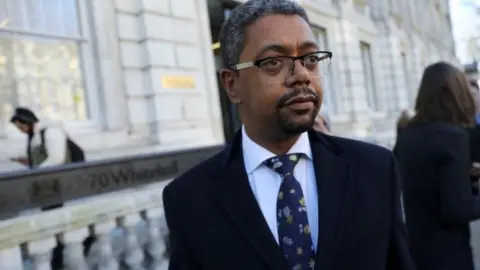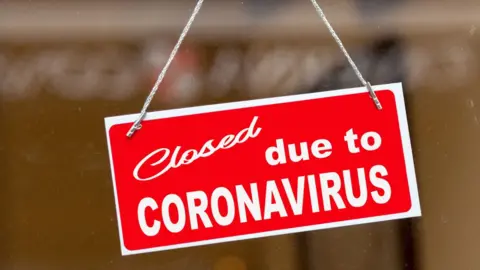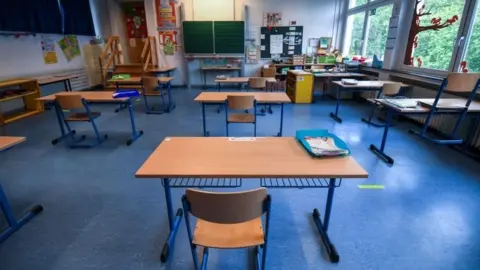Coronavirus: What decisions are made in Wales?
 Getty Images
Getty ImagesHow are the decisions carved up when it comes to coronavirus?
With many policy responsibilities devolved to Wales - across areas including health, social care and education - there are decisions which are in the in-trays of ministers in Cardiff Bay.
But other important responsibilities - like who is paying a big chunk of people's salaries while businesses are forced to close - lies in Westminster.
So who does what?
Health
The NHS and public health is devolved in Wales, so the decisions on how health boards are responding to the enormous challenges in our hospitals and communities ultimately rest with the health minister here.
Decisions on how to change lockdown measures - which have affected the lives of everyone - have been made in Wales too.
 Reuters
ReutersWelsh ministers are in regular meetings with their counterparts in the other UK nations, at Cobra meetings for example, as well as receiving scientific advice from the Scientific Advisory Group for Emergencies (Sage).
But Wales has its own chief medical officer too, a key adviser, who will also be taking advice from colleagues in other countries.
Wales has already decided to go its own way in not setting a target for testing or offering tests to all people over the age of 65. Although the Welsh Government says after listening to "latest evidence" all residents and staff in care homes will now be tested - where someone has coronavirus or is in a large care home.
It insists that testing key workers who have symptoms is the best use of resources at this stage.
How are changes in lockdown different in Wales?
The Welsh Government has announced some changes so people will be able to exercise more than once a day.
Garden centres will also be allowed to reopen if they can meet the social distancing rules.
But the first minister said the "stay at home" advice remained in Wales - in contrast to England, where the message has changed to "stay alert".
Prime Minister Boris Johnson has announced a more significant relaxation of the lockdown for England, with people encouraged to return to work and a plan to reopen schools in June.
Welsh counsel general Jeremy Miles said the position on lockdown was "rather different in Wales".
Scotland and Northern Ireland have joined Wales in keeping a stricter lockdown than in England.
The first minister had said he favoured a "four-nation approach," saying taking different geographic responses would be "fraught with difficulties".
But Mr Drakeford said he would do things differently if medical advice was to do so and it was right for Wales.
He has set out seven key questions as to whether easing a restriction would have a negative effect on containing the virus.
These include whether it risks further infection, if it can be monitored and enforced, and if it was possible to reverse quickly if it created unintended consequences.
 Gwengoat/Getty Images
Gwengoat/Getty ImagesWork and business
With many places of work closed and workers "furloughed", the virus has had a big impact - and different help falls under the umbrellas of either the Welsh Government or UK government.
So if you're being paid 80% of your usual salary - up to £2,500 a month - this comes from the UK government. It also looks after sick pay.
It also helps companies of different sizes with business interruption loans - and also income support for the self-employed. Westminster - through HM Customs and Revenue - is also managing tax deferrals.
 Getty Images
Getty ImagesBut the Welsh Government is responsible for economic development - and so it is offering grants for small and medium-sized business through its economic resilience fund.
Its finance arm, the Development Bank for Wales, has already provided £100m in business loans and is also offering capital repayment holidays.
Meanwhile, councils - mostly funded by Welsh Government - are offering a year's relief on business rates for shops, leisure and hospitality businesses, and also offering small grants. Local councils are calculated to have distributed £508m to 41,000 businesses by the end of April.
 Getty Images
Getty ImagesEducation
Schools across the UK closed on 20 March to all but pupils who are vulnerable or those of critical workers. Education is devolved, however, so the decision was made by the Welsh Government - as will be the decision to reopen them.
But how education is provided in those schools which are already open are the responsibility of local councils, subject to guidance.
Education Minister Kirsty Williams has suggested a phased return is likely, when the time is right, while it appears it would take three weeks before the first children go back from when a decision is taken.
In England, Boris Johnson said he hoped the next step in easing the lockdown there would be the reopening of primary schools.
 Getty Images
Getty ImagesSocial care
This is another devolved area and the responsibility lies with local councils in Wales.
In a normal year, caring for the elderly takes up about a third of council social services budgets.
Councils have been under particular pressure because of the importance of social care to the work they do and staff having to work in the most challenging of circumstances.
The Welsh Government recently received £95m extra - as part of a wider UK government announcement for councils. Council leaders say they have been facing "soaring demand" at a time their general coffers have been depleted by a £33m a month loss of income.
Welsh Government meanwhile has announced all social care workers will get a cash bonus of £500 each to recognise the work they are doing.
So are there big differences?
The testing policy has emerged as the obvious difference. Others are smaller - like the size of the fixed penalty notice for breaking lockdown restrictions. This is £60 but in England it can rise to £960 for repeat offenders, but only to a £120 maximum in Wales.
In general though, this is a pandemic which knows no borders - and cooperation between all governments and best practice are the watch words.
